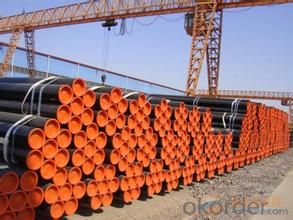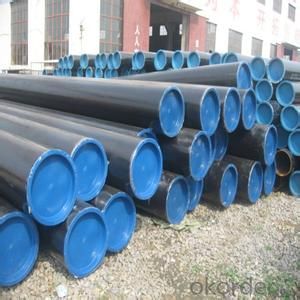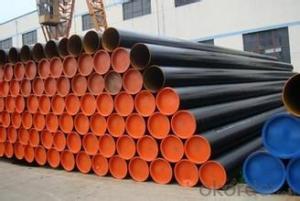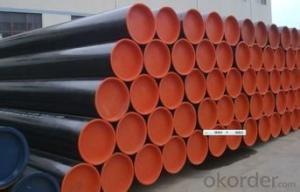Supply Seamless Steel Pipe API Certificate
- Loading Port:
- Tianjin
- Payment Terms:
- TT OR LC
- Min Order Qty:
- 30 m.t.
- Supply Capability:
- 8000 m.t./month
OKorder Service Pledge
OKorder Financial Service
You Might Also Like
1、Structure of Supply Seamless Steel Pipe API Certificate
Seamless pipe is formed by drawing a solid billet over a piercing rod to create the hollow shell. As the manufacturing process does not include any welding, seamless pipes are perceived to be stronger and more reliable. Historically seamless pipe was regarded as withstanding pressure better than other types, and was often more easily available than welded pipe.
2、Main Features of Supply Seamless Steel Pipe API Certificate
• High manufacturing accuracy
• High strength
• Strong heat dissipation ability
• Good visual effect
• Reasonable price
• Small inertia resistance
3、Supply Seamless Steel Pipe API Certificate Specification:
Standard | GB, DIN, ASTM ASTM A106-2006, ASTM A53-2007 |
Grade | 10#-45#, 16Mn 10#, 20#, 45#, 16Mn |
Thickness | 8 - 33 mm |
Section Shape | Round |
Outer Diameter | 133 - 219 mm |
Place of Origin | Shandong, China (Mainland) |
Secondary Or Not | Non-secondary |
Application | Hydraulic Pipe |
Technique | Cold Drawn |
Certification | API |
Surface Treatment | factory state or painted black |
Special Pipe | API Pipe |
Alloy Or Not | Non-alloy |
Length | 5-12M |
Outer Diameter | 21.3-610mm |
Grade | 20#, 45#, Q345, API J55, API K55, API L80, API N80, API P110, A53B |
Standard | ASME, ASTM |
1) Material:20#(ASTM A 106/A53 GRB.API5LGRB,GB),45#,16Mn,10#.
2) Specification range:OD:21.3-610mm,WT:6-70mm,length:6-12m or according to the requirement of clients.
3) Excutive standards:GB,ASME API5L.ASTM A 106/A53,Despite of the above standards,we can also supply seamless steel pipe with standard of DIN,JIS,and so on,and also develop new products according to the requirements of our clients!
4) Surface:black lacquered,varnish coating or galvanized.
5) Ends:Beveled or square cut,plastic capped,painted.
6) Packing:bundles wrapped with strong steel strip,seaworthy packing.
4、Packaging & Delivery
Packaging Details: | seaworthy package,bundles wrapped with strong steel strip |
Delivery Detail: | 15-30days after received 30%TT |
5、FAQ of Supply Seamless Steel Pipe API Certificate
①How is the quality of your products?
Our products are manufactured strictly according to national and internaional standard, and we take a test
on every pipe before delivered out. If you want see our quality certifications and all kinds of testing report, please just ask us for it.
Guaranteed: If products’ quality don’t accord to discription as we give or the promise before you place order, we promise 100% refund.
②How about price?
Yes, we are factory and be able to give you lowest price below market one, and we have a policy that “ for saving time and absolutely honest business attitude, we quote as lowest as possible for any customer, and discount can be given according to quantity”,if you like bargain and factory price is not low enough as you think, just don’t waste your time.Please trust the quotation we would give you, it is professional one.
③Why should you chose us?
Chose happens because of quality, then price, We can give you both.Additionally, we can also offer professional products inquiry, products knowledge train(for agents), smooth goods delivery, exellent customer solution proposals.Our service formula: good quality+good price+good service=customer’s trust
SGS test is available, customer inspection before shipping is welcome, third party inspection is no problem.
6、Supply Seamless Steel Pipe API Certificate Images:


- Q:What are the disadvantages of using steel pipes?
- One major disadvantage of using steel pipes is their susceptibility to corrosion. Over time, exposure to moisture and certain chemicals can cause the steel to rust, leading to structural weakness and potential leaks. Another drawback is the high cost of steel pipes compared to alternative materials such as plastic or copper. Additionally, steel pipes are relatively heavy and can be challenging to handle and transport.
- Q:Can steel pipes be used for wastewater treatment facilities?
- Yes, steel pipes can be used for wastewater treatment facilities. Steel pipes are known for their durability, corrosion resistance, and high strength, which makes them suitable for handling various types of wastewater and harsh chemicals. Additionally, steel pipes can be easily welded, allowing for flexibility in design and installation.
- Q:How do steel pipes handle water erosion?
- Steel pipes are highly resistant to water erosion due to their inherent strength and durability. The smooth surface of steel pipes minimizes friction and turbulence, reducing the likelihood of erosion. Additionally, steel pipes can be coated with protective layers, such as galvanization or epoxy, that further enhance their resistance to water erosion.
- Q:How are steel pipes protected against external moisture?
- Steel pipes are protected against external moisture through a variety of methods. One common method is the application of a protective coating or paint on the surface of the pipes. This coating acts as a barrier, preventing moisture from coming into direct contact with the steel. The coating can be made of different materials, such as epoxy, polyethylene, or zinc, depending on the specific requirements and environment. Another method of protection is through the use of corrosion inhibitors. These inhibitors are added to the internal or external surfaces of the pipes, forming a protective layer that prevents moisture from causing corrosion. Corrosion inhibitors can be in the form of chemicals, such as rust converters or rust preventatives, which react with the steel to form a protective barrier. Additionally, steel pipes can be protected against external moisture through cathodic protection. This technique involves the use of sacrificial anodes or impressed current to create an electric current that protects the steel. Sacrificial anodes, typically made of zinc, aluminum, or magnesium, are attached to the steel pipes and corrode over time instead of the steel, thus preventing moisture-induced corrosion. Furthermore, proper insulation and waterproofing measures are crucial in protecting steel pipes from external moisture. Insulation materials, such as foam or tape, are applied to the pipes to provide an additional layer of protection and prevent moisture infiltration. Waterproofing measures, such as the use of sealants or membranes, can also be implemented to ensure that no moisture seeps into the pipes. Regular maintenance, including inspections and repairs, is essential to ensure the continued protection of steel pipes against external moisture. By promptly addressing any areas of damage or corrosion, the integrity of the protective measures can be maintained, prolonging the lifespan of the steel pipes and preventing costly repairs or replacements in the future.
- Q:Can steel pipes be used for conveying liquids and gases?
- Indeed, the utilization of steel pipes extends to the conveyance of both liquids and gases. These pipes find widespread application across a multitude of industries, including oil and gas, water supply, plumbing, and industrial processes. Their commendable attributes encompass robustness, longevity, and resistance to corrosion. Consequently, steel pipes possess the capacity to withstand elevated pressure and temperature, rendering them ideal for the transportation of an extensive array of liquids and gases such as water, oil, natural gas, steam, and chemicals. Furthermore, the convenience of welding or threading steel pipes together facilitates effortless installation and maintenance procedures.
- Q:What are the factors to consider when selecting a steel pipe for a specific application?
- When selecting a steel pipe for a specific application, there are several factors that need to be considered. These factors include the required strength and durability, the intended use and environment, the size and dimensions needed, the corrosion resistance properties required, the temperature and pressure conditions, and the budget available for the project. By taking all these factors into account, one can choose the most suitable steel pipe that meets the specific requirements of the application.
- Q:How are steel pipes tested for leakage?
- Steel pipes are typically tested for leakage using various methods such as hydrostatic testing, ultrasonic testing, or dye penetrant testing. Hydrostatic testing involves pressurizing the pipe with water or another suitable liquid to a predetermined level and checking for any pressure drop over a specific period of time, indicating potential leakage. Ultrasonic testing utilizes high-frequency sound waves to detect any defects or cracks in the pipe wall that may cause leakage. Dye penetrant testing involves applying a colored liquid to the surface of the pipe, which seeps into any cracks or openings, making them easily visible under specific lighting, thus identifying potential leaks.
- Q:Are steel pipes suitable for underground compressed air systems?
- Yes, steel pipes are generally suitable for underground compressed air systems. Steel pipes have several advantages that make them a popular choice for such applications. Firstly, steel pipes are known for their high strength and durability, which allows them to withstand the pressure and stress associated with compressed air systems. They can handle high operating pressures without any significant risk of bursting or leaking. Secondly, steel pipes have excellent resistance to corrosion and can withstand exposure to moisture, soil, and other underground elements. This makes them a reliable choice for underground installations, where pipes may be exposed to moisture and other potentially corrosive substances. Furthermore, steel pipes are relatively easy to install and maintain. They can be welded or threaded together, ensuring a secure and leak-free connection. Additionally, steel pipes can be easily inspected and repaired if necessary, allowing for cost-effective maintenance and repairs. However, it is important to note that the suitability of steel pipes for underground compressed air systems may also depend on other factors such as the specific requirements and conditions of the system. It is advisable to consult with a professional engineer or a qualified expert to ensure that steel pipes are the most appropriate choice for a specific application.
- Q:Can steel pipes be used for sewage treatment plants?
- Yes, steel pipes can be used for sewage treatment plants. Steel pipes are commonly used in sewage treatment plants due to their durability, strength, and resistance to corrosion. They are suitable for transporting sewage, wastewater, and other fluids in these facilities.
- Q:Can steel pipes be used for underground electrical conduits?
- Yes, steel pipes can be used for underground electrical conduits.
1. Manufacturer Overview |
|
|---|---|
| Location | |
| Year Established | |
| Annual Output Value | |
| Main Markets | |
| Company Certifications | |
2. Manufacturer Certificates |
|
|---|---|
| a) Certification Name | |
| Range | |
| Reference | |
| Validity Period | |
3. Manufacturer Capability |
|
|---|---|
| a)Trade Capacity | |
| Nearest Port | |
| Export Percentage | |
| No.of Employees in Trade Department | |
| Language Spoken: | |
| b)Factory Information | |
| Factory Size: | |
| No. of Production Lines | |
| Contract Manufacturing | |
| Product Price Range | |
Send your message to us
Supply Seamless Steel Pipe API Certificate
- Loading Port:
- Tianjin
- Payment Terms:
- TT OR LC
- Min Order Qty:
- 30 m.t.
- Supply Capability:
- 8000 m.t./month
OKorder Service Pledge
OKorder Financial Service
Similar products
New products
Hot products
Hot Searches
Related keywords































